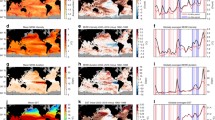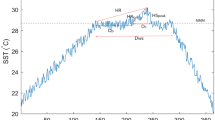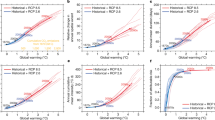Abstract
Marine heatwaves (MHWs) can cause irreversible damage to marine ecosystems and livelihoods. Appropriate MHW characterization remains difficult, because the choice of a sea surface temperature (SST) temporal baseline strongly influences MHW identification. Following a recent work suggesting that there should be a communicating baseline for long-term ocean temperature trends (LTT) and MHWs, we provided an effective and quantitative solution to calculate LTT and MHWs simultaneously by using the ensemble empirical mode decomposition (EEMD) method. The long-term nonlinear trend of SST obtained by EEMD shows superiority over the traditional linear trend in that the data extension does not alter prior results. The MHWs identified from the detrended SST data exhibited low sensitivity to the baseline choice, demonstrating the robustness of our method. We also derived the total heat exposure (THE) by combining LTT and MHWs. The THE was sensitive to the fixed-period baseline choice, with a response to increasing SST that depended on the onset time of a perpetual MHW state (identified MHW days equal to the year length). Subtropical areas, the Indian Ocean, and part of the Southern Ocean were most sensitive to the long-term global warming trend.
Similar content being viewed by others
Data Availability Statement
The MPI-ESM1.2-HR daily SST data are available on the WCRP CMIP6 website at https://esgf-node.llnl.gov/search/cmip6/. The code used to identify MHW events is publicly available at https://github.com/ZijieZhaoMMHW/m_mhw1.0. The EMD package used for nonlinear trend analysis is available in MATLAB version 2018a and later versions.
References
Alexander M A, Scott J D, Friedland K D et al. 2018. Projected sea surface temperatures over the 21st century: changes in the mean, variability and extremes for large marine ecosystem regions of Northern Oceans. Elementa: Science of the Anthropocene, 6(1): 9, https://doi.org/10.1525/elementa.191.
Amaya D J, Jacox M G, Fewings M R et al. 2023. Marine heatwaves need clear definitions so coastal communities can adapt. Nature, 616(7955): 29–32, https://doi.org/10.1038/d41586-023-00924-2.
Bruno J F, Bates A E, Cacciapaglia C et al. 2018. Climate change threatens the world’s marine protected areas. Nature Climate Change, 8(6): 499–503, https://doi.org/10.1038/s41558-018-0149-2.
Cavole L M, Demko A M, Diner R E et al. 2016. Biological impacts of the 2013–2015 warm-water anomaly in the Northeast Pacific: winners, losers, and the future. Oceanography, 29(2): 273–285, https://doi.org/10.5670/oceanog.2016.32.
Cheng Y Y, Zhang M, Song Z Y et al. 2023. A quantitative analysis of marine heatwaves in response to rising sea surface temperature. Science of the Total Environment, 881: 163396, https://doi.org/10.1016/j.scitotenv.2023.163396.
Frölicher T L, Fischer E M, Gruber N. 2018. Marine heatwaves under global warming. Nature, 560(7718): 360–364, https://doi.org/10.1038/s41586-018-0383-9.
Guo X W, Gao Y, Zhang S Q et al. 2022. Threat by marine heatwaves to adaptive large marine ecosystems in an eddy-resolving model. Nature Climate Change, 12(2): 179–186, https://doi.org/10.1038/s41558-021-01266-5.
Han Y, Zhang M Z, Xu Z F et al. 2022. Assessing the performance of 33 CMIP6 models in simulating the large-scale environmental fields of tropical cyclones. Climate Dynamics, 58(5): 1683–1698, https://doi.org/10.1007/s00382-021-05986-4.
Hobday A J, Alexander L V, Perkins S E et al. 2016. A hierarchical approach to defining marine heatwaves. Progress in Oceanography, 141: 227–238, https://doi.org/10.1016/j.pocean.2015.12.014.
Holbrook N J, Sen Gupta A, Oliver E C J et al. 2020. Keeping pace with marine heatwaves. Nature Reviews Earth & Environment, 1(9): 482–493, https://doi.org/10.1038/s43017-020-0068-4.
Huang N E, Shen Z, Long S R et al. 1998. The empirical mode decomposition and the Hilbert spectrum for nonlinear and non-stationary time series analysis. Proceedings of the Royal Society A: Mathematical, Physical and Engineering Sciences, 454(1971): 903–995, https://doi.org/10.1098/rspa.1998.0193.
Jacox M G. 2019. Marine heatwaves in a changing climate. Nature, 571(7766): 485–487, https://doi.org/10.1038/d41586-019-02196-1.
Jacox M G, Alexander M A, Bograd S J et al. 2020. Thermal displacement by marine heatwaves. Nature, 584(7819): 82–86, https://doi.org/10.1038/s41586-020-2534-z.
Ji F, Wu Z H, Huang J P et al. 2014. Evolution of land surface air temperature trend. Nature Climate Change, 4(6): 462–466, https://doi.org/10.1038/nclimate2223.
Jones T, Parrish J K, Peterson W T et al. 2018. Massive mortality of a planktivorous seabird in response to a marine heatwave. Geophysical Research Letters, 45(7): 3193–3202, https://doi.org/10.1002/2017GL076164.
Masson-Delmotte V, Zhai P M, Pirani A et al. 2021. Climate Change 2021: The Physical Science Basis. Contribution of Working Group I to the Sixth Assessment Report of the Intergovernmental Panel on Climate Change. Cambridge University Press, Cambridge.
Müller W A, Jungclaus J H, Mauritsen T et al. 2018. A higher-resolution version of the Max Planck Institute Earth System Model (MPI-ESM1.2-HR). Journal of Advances in Modeling Earth Systems, 10(7): 1383–1413, https://doi.org/10.1029/2017MS001217.
Oliver E C J. 2019. Mean warming not variability drives marine heatwave trends. Climate Dynamics, 53(3–4): 1653–1659, https://doi.org/10.1007/s00382-019-04707-2.
Oliver E C J, Benthuysen J A, Darmaraki S et al. 2021. Marine heatwaves. Annual Review of Marine Science, 13: 313–342, https://doi.org/10.1146/annurev-marine-032720-095144.
Oliver E C J, Burrows M T, Donat M G et al. 2019. Projected marine heatwaves in the 21st century and the potential for ecological impact. Frontiers in Marine Science, 6: 734, https://doi.org/10.3389/fmars.2019.00734.
Oliver E C J, Donat M G, Burrows M T et al. 2018. Longer and more frequent marine heatwaves over the past century. Nature Communications, 9(1): 1324, https://doi.org/10.1038/s41467-018-03732-9.
Qian C, Wu Z H, Fu C B et al. 2011. On changing El Niño: a view from time-varying annual cycle, interannual variability, and mean state. Journal of Climate, 24(24): 6486–6500, https://doi.org/10.1175/JCLI-D-10-05012.1.
Richter I, Tokinaga H. 2020. An overview of the performance of CMIP6 models in the tropical Atlantic: mean state, variability, and remote impacts. Climate Dynamics, 55(9): 2579–2601, https://doi.org/10.1007/s00382-020-05409-w.
Smale D A, Wernberg T, Oliver E C J et al. 2019. Marine heatwaves threaten global biodiversity and the provision of ecosystem services. Nature Climate Change, 9(4): 306–312, https://doi.org/10.1038/s41558-019-0412-1.
Smith K E, Burrows M T, Hobday A J et al. 2021. Socioeconomic impacts of marine heatwaves: global issues and opportunities. Science, 374(6566): eabj3593, https://doi.org/10.1126/science.abj3593.
Wang S P, Jing Z, Sun D et al. 2022a. A new model for isolating the marine heatwave changes under warming scenarios. Journal of Atmospheric and Oceanic Technology, 39(9): 1353–1366, https://doi.org/10.1175/JTECH-D-21-0142.1.
Wang S P, Jing Z, Wu L X et al. 2022b. Changing ocean seasonal cycle escalates destructive marine heatwaves in a warming climate. Environmental Research Letters, 17(5): 054024, https://doi.org/10.1088/1748-9326/ac6685.
Wernberg T, Bennett S, Babcock R C et al. 2016. Climate-driven regime shift of a temperate marine ecosystem. Science, 353(6295): 169–172, https://doi.org/10.1126/science.aad8745.
WMO. 2018. Guide to Climatological Practices. WMO-No. 100, WMO, Geneva.
Wu Z H, Huang N E. 2009. Ensemble empirical mode decomposition: a noise-assisted data analysis method. Advances in Adaptive Data Analysis, 1(1): 1–41, https://doi.org/10.1142/S1793536909000047.
Wu Z H, Huang N E, Chen X Y. 2009. The multi-dimensional ensemble empirical mode decomposition method. Advances in Adaptive Data Analysis, 1(3): 339–372, https://doi.org/10.1142/S1793536909000187.
Wu Z H, Huang N E, Long S R et al. 2007. On the trend, detrending, and variability of nonlinear and nonstationary time series. Proceedings of the National Academy of Sciences of the United States of America, 104(38): 14889–14894, https://doi.org/10.1073/pnas.0701020104.
Wu Z H, Huang N E, Wallace J M et al. 2011. On the time-varying trend in global-mean surface temperature. Climate Dynamics, 37(3): 759–773, https://doi.org/10.1007/s00382-011-1128-8.
Xu T T, Newman M, Capotondi A et al. 2022a. An increase in marine heatwaves without significant changes in surface ocean temperature variability. Nature Communications, 13(1): 7396, https://doi.org/10.1038/s41467-022-34934-x.
Xu Z H, Huang G, Ji F et al. 2022b. Robustness of the long-term nonlinear evolution of global sea surface temperature trend. Geoscience Letters, 9(1): 25, https://doi.org/10.21203/rs.3.rs-1411109/v1.
Xu Z H, Ji F, Liu B, Feng T, Gao Y, He Y, Chang F. 2021. Long-term evolution of global sea surface temperature trend. International Journal of Climatology, 41(9): 4494–4508, https://doi.org/10.1002/joc.7082.
Zhang M, Cheng Y Y, Bao Y et al. 2022. Seasonal to decadal spatiotemporal variations of the global ocean carbon sink. Global Change Biology, 28(5): 1786–1797, https://doi.org/10.1111/gcb.16031.
Zhang M, Wu Z H, Qiao F L. 2018. Deep Atlantic Ocean warming facilitated by the deep western boundary current and equatorial Kelvin waves. Journal of Climate, 31(20): 8541–8555, https://doi.org/10.1175/JCLI-D-18-0255.1.
Zhao Y, Chen M R, Chung T H et al. 2023. The 2022 summer marine heatwaves and coral bleaching in China’s Greater Bay Area. Marine Environmental Research, 189: 106044, https://doi.org/10.1016/j.marenvres.2023.106044.
Author information
Authors and Affiliations
Corresponding author
Additional information
Supported by the National Natural Science Foundation of China (Nos. 41821004, 42276025), the Natural Science Foundation of Shandong Province (No. ZR2021MD027), the National Key Research and Development Program of China (No. 2022YFE0140500), and the Project of “Development of China-ASEAN blue partnership” started in 2021. This work is a contribution to the UN Decade of Ocean Science for Sustainable Development (2021–2030) through both the Decade Collaborative Centre on Ocean-Climate nexus and Coordination amongst decade implementing partners in China (DCC-OCC) and the approved Ocean to Climate Seamless Forecasting System Program (OSF)
Electronic Supplementary Material
Rights and permissions
About this article
Cite this article
Zhang, M., Cheng, Y., Wang, G. et al. Long-term ocean temperature trend and marine heatwaves. J. Ocean. Limnol. (2024). https://doi.org/10.1007/s00343-023-3160-z
Received:
Accepted:
Published:
DOI: https://doi.org/10.1007/s00343-023-3160-z




